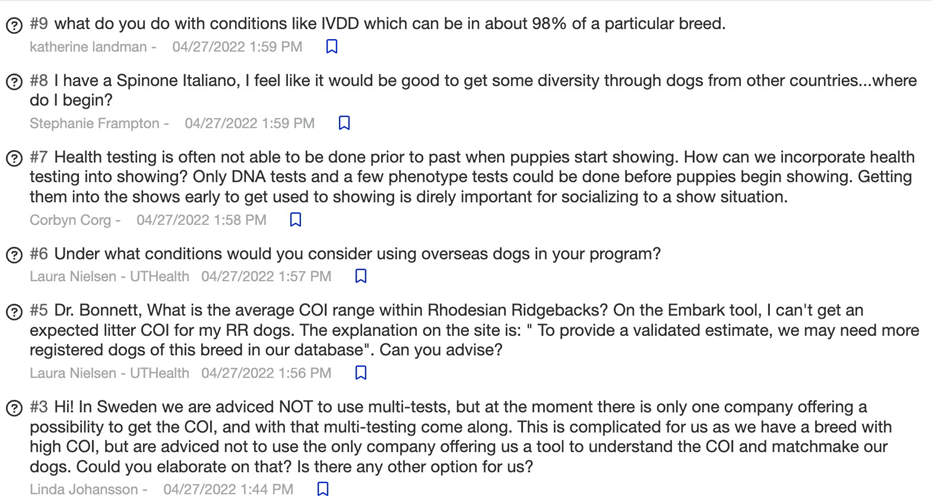Q&A from Embark Summit
I will answer questions here
Follow numbers below:

#3- As I understand it, part of the reluctance to using panel tests is the law in Sweden - e.g. if a dog tests positive (e.g. a false positive) for a condition known NOT to occur in the breed it can render the animal 'un-breedable'. IF that is the reasoning,... I can't help.
In general, use of panel tests is okay, as long as results are interpretted as appropriate for the breed - i.e. using our IPFD Breed Relevance Ratings.
If you communicate with the genetic test provider, they should be able to give you the results only for breed relevant tests. At least theortically.
What not discuss the possibilities?
#5 - if they don't have enought animals then thank them for being clear about that! it is very important that COIs not be calculated on too few animals to prevent misconceptions.
For both 3 and 5 - in the meantime try to get pedigree based COIs from as many generations as possible - and know that they likely understimate the true level of inbreeding.
#6 - use of dogs as a within breed outcrossing - you need to be sure about their level of relatedness. Geography doesn't always guarantee genetic difference. Look for dogs - with or from outside the country WITHOUT overlapping progenitors. How far back? As far as you can go, theoretically. If the do not share 'any' ancestors you will likely improve the genetic diversity in the offspring.
#7 - to answer this question - and somewhat theoretically - you can genetic test at any age, for conditions like hip and elbow dyspasia would have to wait. If you simply had to show puppies, you would be working from the sires/dams/ancestors of the showing dogs. And then... one might want to consider NOT giving conformation titles on very young dogs... until they can be health-tested clear for important problems. And certainly not using sires and dams before you know they are free and follow that their progeny are free. If a condition doesn't occur until older ages... wait before using the sire, at least. IF you think about it... it is almost silly to declare an immature dog as a great representative of the breed at an age when he or she would not have shown important problems, even if they existed. So puppies can be socialized to shows in puppy classes that DON'T count for titles.
#8 - Sorry I don't know where to find you a Spinone. But check the answer to #6, above.
#9 - an important question. For information on IVDD I direct you to Ian Seath in the UK, and the Dachshund Breed Council database. However, a few comments. IVDD is a genetic test... how does it correlate with the presentation of the disease. We have recently done article on degenerative myelopathy where the genetic test is simply NOT a reliable predictor of the disease. So, a test like IVDD has to be used very sensibly and the Dachshund BC has loads of information.
Chondrodystrophic dogs by definition have the gene - they are not all terrible specimens or going to suffer back diseease - but they all need to be kept in shape, no obesity, fit, etc.
This might be different, than say, French Bulldogs where almost all of them have missing or hemi-vertebrae. We probably have to accept this as an expression of abnormality, in and of itself. Where there are no 'normal' dogs... one might have to condsider out crossing as the only 'fix'.


Recommended Comments